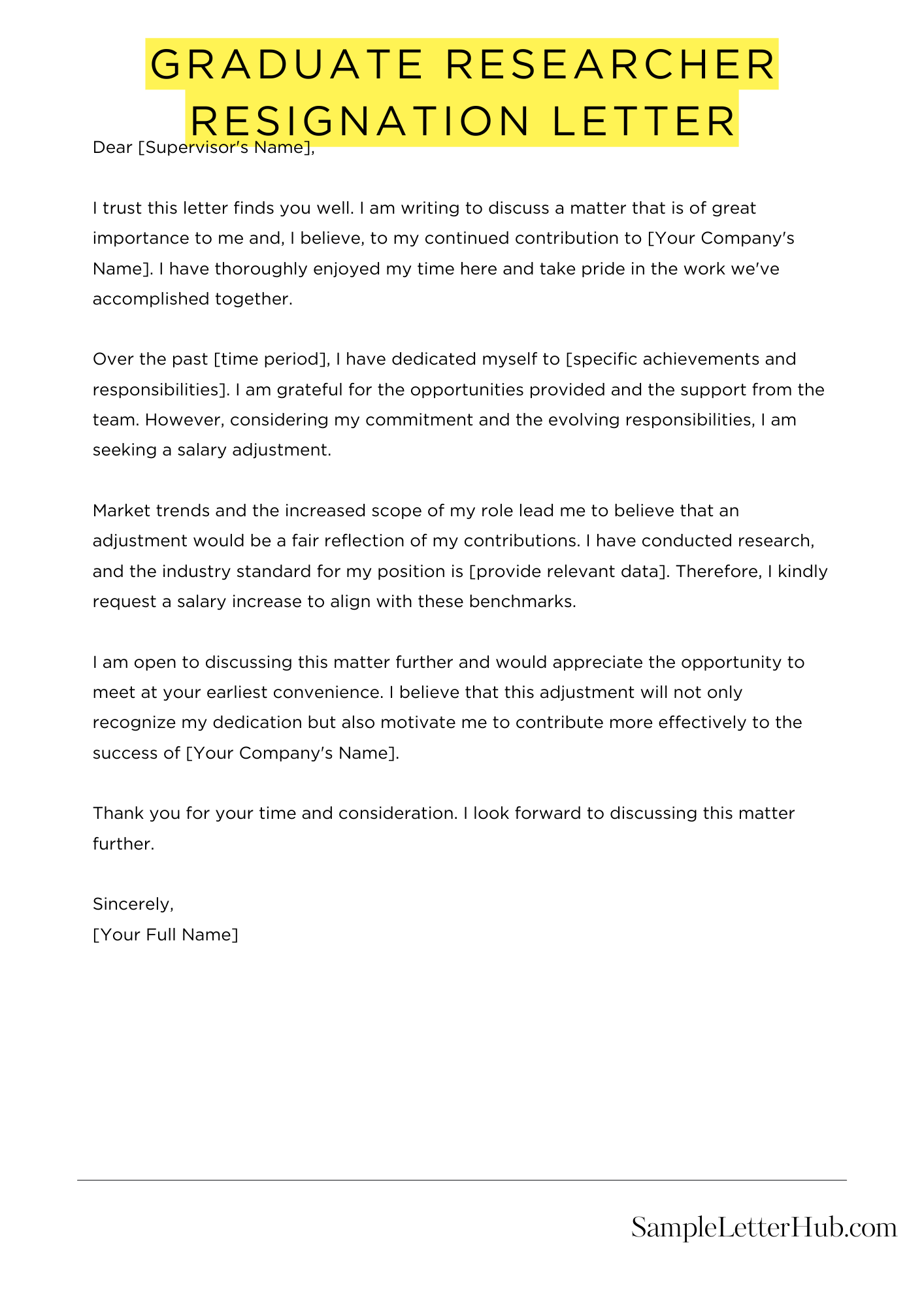Hey there, graduate researcher! Are you thinking about moving on from your current position? If so, you’ll need to write a graduate researcher resignation letter. Don’t worry, we’ve got you covered. We’ll share an example of a graduate researcher resignation letter with you below.
When it comes to leaving a job, one of the most important things you can do is write a clear and professional resignation letter. This letter should explain your decision to leave and express your gratitude for the opportunity to work at the organization. It’s also important to be polite and humble in your letter. Remember, you want to leave a good impression on your employer, even if you’re moving on to bigger and better things.
Below, we’ve shared a template/example graduate researcher resignation letter that you can use. Feel free to adapt it to your own needs. Just remember to be clear, concise, and professional. And don’t forget to proofread your letter before you submit it!
Graduate Researcher Resignation Letter
Dear [Recipient Name],
Please accept this letter as formal notification that I will be resigning from my position as a Graduate Researcher in the [Department Name] at [University Name], effective [Last Date of Employment].
I have enjoyed my time at [University Name] and am grateful for the opportunities and experiences I have gained during my tenure. I have learned invaluable skills and knowledge that will serve me well in my future endeavors.
I wish you and the department all the best in the future.
Sincerely,
[Your Signature]
Short Graduate Researcher Resignation Letter Sample
Please accept this letter as formal notification that I am resigning from my position as Graduate Researcher at [Company Name]. My last day of employment will be [Your Last Day]. Thank you for the opportunity to grow and learn during my time here. I wish you and the company continued success. I am happy to assist in the transition process to ensure a smooth handover of my responsibilities.
I wish you all the best with your graduate researcher resignation letter.
When it’s time to say farewell, expressing your gratitude and best wishes can make the transition smoother:

How to Write a Graduate Researcher Resignation Letter
1. Start with a Formal Salutation
Begin your letter with a formal salutation, such as “Dear [Supervisor’s Name].”
2. Express Your Gratitude
Express your gratitude for the opportunity to work as a graduate researcher under your supervisor’s guidance. Mention specific experiences or projects that you have enjoyed or learned from.
3. State Your Resignation
Clearly state your intention to resign from your position as a graduate researcher. Include the date on which your resignation will take effect.
4. Offer to Assist with the Transition
Offer to assist with the transition during your notice period. This could include training a replacement or completing any outstanding projects.
5. End with a Professional Closing
End your letter with a professional closing, such as “Sincerely,” followed by your signature and typed name.
Graduate Researcher Resignation Letter: 6 FAQs
When it comes to resigning from your position as a graduate researcher, there are a few key questions that often arise. Here are the six most frequently asked questions and their answers:
1. What should I include in my resignation letter?
Your resignation letter should include the following information:
- Your name and contact information
- The date
- The name of the person you are resigning to
- A statement that you are resigning from your position as a graduate researcher
- Your last date of employment
- A brief expression of gratitude for the opportunity to work in the lab
2. How should I format my resignation letter?
Your resignation letter should be formatted in a professional manner. Use a standard font, such as Times New Roman or Arial, and 12-point font size. Left-align your text and use single spacing.
3. How long should my resignation letter be?
Your resignation letter should be brief and to the point. Aim for no more than a few paragraphs.
4. When should I submit my resignation letter?
It is generally advisable to submit your resignation letter two weeks before your last date of employment. This will give your supervisor time to find a replacement.
5. What should I do if I am leaving on bad terms?
If you are leaving on bad terms, it is important to remain professional in your resignation letter. Avoid making any negative comments about your supervisor or the lab.
6. What if I am not sure what to say in my resignation letter?
If you are not sure what to say in your resignation letter, you can consult with a career counselor or human resources representative. They can help you draft a letter that is professional and appropriate.
Before making the decision to resign from your job, it’s essential to consider the legal aspects:
Understanding your emotions after quitting your job is important. Explore why you might be feeling sad:
Related
- Resignation letter sample
- Forced resignation letter
- Resignation letter due to going abroad
- Resignation letter due to marriage
- Resignation letter due to other opportunity
- Resignation letter due to mistake

